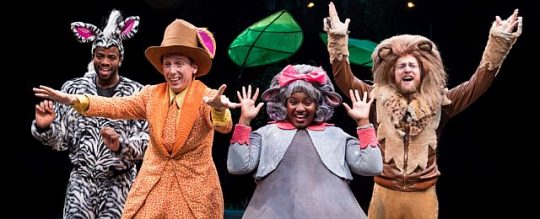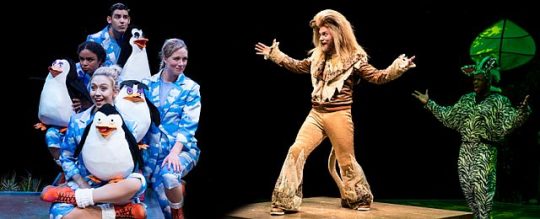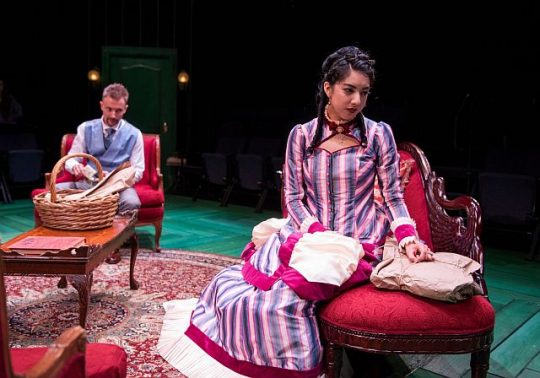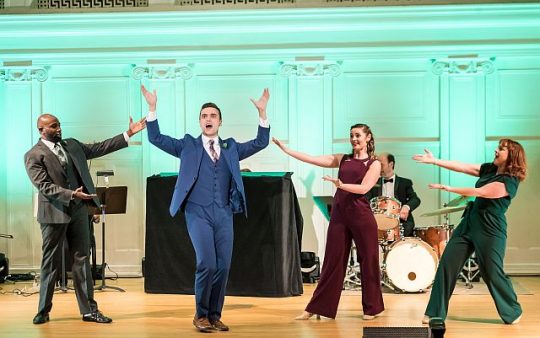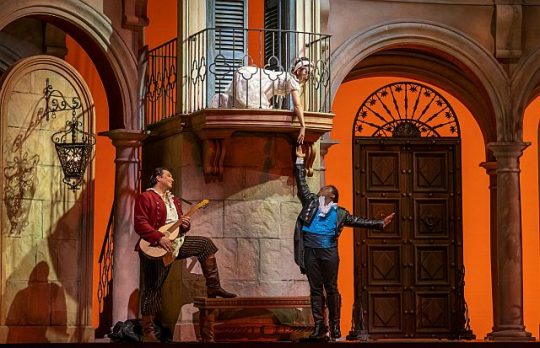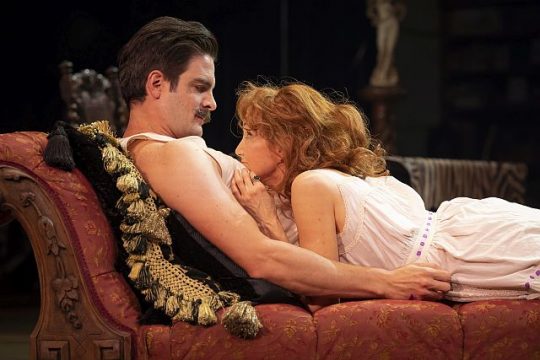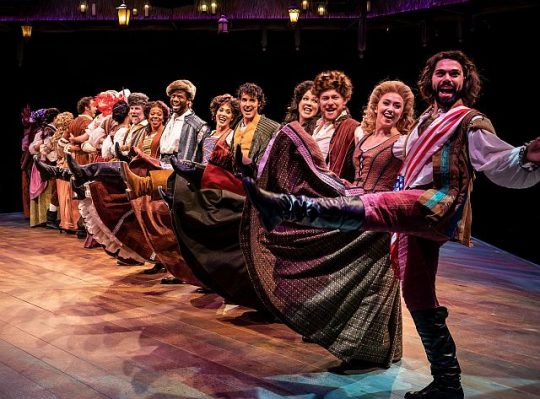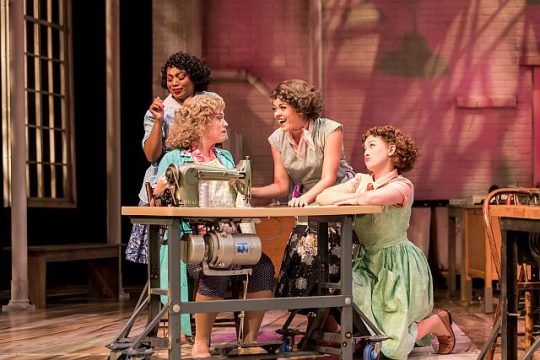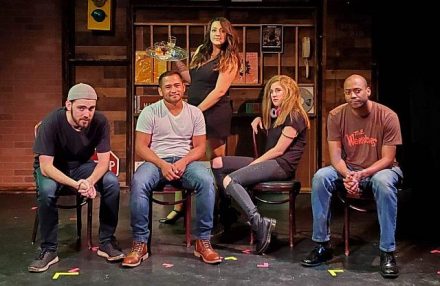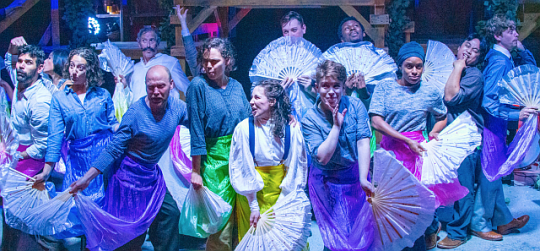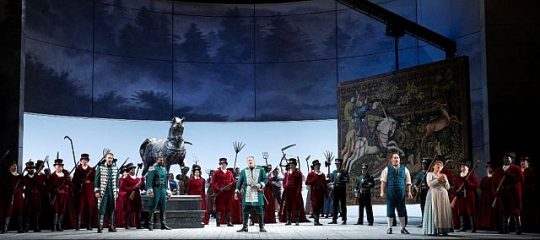
4 stars
Love, lust, and quest for power lead to despair and death in Giuseppe Verdi’s “Luisa Miller,” directed by Francesca Zambello at Lyric Opera of Chicago.
The seemingly outlandish story based on the play “Kabale und Liebe” (Intrigue and Love) by Friedrich von Schiller, none-the-less may resonate with modern audiences familiar with such television programs as “American Greed” and “Dateline” that often have devious plots designed and perpetrated by individuals to preserve financial power or exert influence over those they purport to love.
In this case, Rudolfo (Joseph Calleja), the son of Count Walter (Christian Van Horn) falls in love with the peasant girl, Luisa Miller, (Krassimira Stoyanova). However, Count Walter’s aide-de-camp, Wurm, (Soloman Howard) also has designs on the local beauty resulting in love triangle number one.
Luisa’s father (Quinn Kelsey) feels there is something odd about Rudolfo who has been hanging around the village under the pseudo name Carlo.
Meanwhile, knowing that the Count was planning to wed his son to the local Duchess Federica (Alisa Kolosova) who has just inherited a fortune after her father’s death, tattletale Wurm tells Count Walter how Rudolfo has fallen in love with a common village girl.
The alliance between Rudolfo and Federica would increase the power and influence of the family, and secure his son’s future, resulting in love triangle number two.
The Count orders his son to marry Federica while Wurm imprisons Luisa’s fathe. Then coerces her into signing a declaration stating that she never loved Rudolfo but instead loves Wurm in order to gain her father’s release and save him from death.
In her despair, she begins to write a letter to Rudolfo suggesting that he meet her at midnight when the two will die together rather than submit to the unhappy fate that has been thrust upon them.
Finding the letter, Luisa’s father, persuades her that in the morning the two of them will simply leave town together because the death of his daughter, and seemingly only offspring, would cause him too much anguish.
During the night while her father is asleep, Rudolfo comes to Luisa whom he tricks into drinking poison. He has taken it as well out of revenge for her recanting her love. Thus is the murder suicide that actually fulfills Luisa’s original plan for them.
The couple reconciles and Rudolfo manages to curse his father and mortally shoot Wurm before the poison takes its full effect.
There is little to say about the spectacular quality of the entire ensemble except to add that Stoyanova as Luisa delivers at every opportunity.
Perhaps part of the popularity of Verdi operas is that they are very accessible to the general public because the music is not overly complex. Though this opera does not have any of the popular famous arias such as “La donna e mobile” or “Celesta Aida,” it follows musical lines that are familiar to the ear.
If you are a lover of mid-century American musicals, I think you will find the structure of Verdi’s operas to have a familiar form.
Reflective of opera’s romantic period which introduces more theatricality into the productions, we can enjoy how the composer uses what have become traditional musical dynamics to convey the emotions of the characters in their over-the-top dramatic situations.
For the singers in this production, it is something of an athletic event as they have very little rest and are seemingly on stage all of the time. They are often performing complex imbroglios that at times seem akin to a wrestling match or singing competition.
It has been said that Verdi hoped to break out of the imposed traditional operatic format that for instance dictated that the production begin with a chorus number.
Interestingly, it was my impression that the opening of “Luisa Miller,” though entertaining and important in terms of setting the context and introducing the characters, has an obligatory quality that seems out of place when compared to the more intimate aspects of the rest of the production.
Perhaps, like the audiences in Verdi’s day, we might feel cheated if we did not have an opportunity to hear, in this case, the exceptional Lyric Chorus. They do appear again but actually each time it seems a bit out-of-step with the story.
Of course part of the reason to visit Lyric Opera Chicago is the opportunity to experience their fine orchestra conducted by Enrique Mazzola and led by Music Director Sir Andrew Davis. It is possible that the overture alone is worth the price of admission.
The scenery, painting, construction design and costumes used in this production are the property of the San Francisco Opera.
The primary scenic element, a large painting suspended from a crane in front of a curved panoramic modular background has an overall post-modern quality even though it is in a muted-toned, 19th century pastoral landscape style.
A standout for the costume department was a dramatic profusion of red riding apparel for the equestrian scene as well as the variation on a theme of green uniforms provided to the gentlemen of Count Walter’s court.
Details: “Luisa Miller” is at the Lyric Opera House, 20 N. Wacker Dr., Chicago through Oct.31, 2019. Running time is about 2 hours 45 minutes with one intermission. For tickets or other information call (312) 827-5600 or visit lyricopera.org/Luisa .
Reno Lovison
For more shows visit Theatre in Chicago

